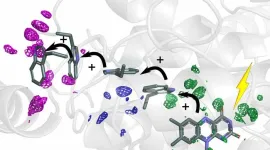(Press-News.org)
Parents of young children with an excitable or exuberant temperament could adapt their parenting style to help moderate their child’s potential development of Attention Deficit/Hyperactivity Disorder (ADHD), according to a new study co-authored by a University of Waterloo researcher.
Developmental psychologists know that temperament, parenting, and the brain’s executive functions are interconnected factors in developing ADHD symptoms throughout childhood. But, the study found specific factors that predict a higher chance of ADHD symptoms, pointing to the importance of early targeted intervention.
“A collection of early traits we call exuberance in child temperament, such as high excitement, curiosity and positive responses to unfamiliar people and contexts, combined with family factors might predispose some kids to develop ADHD symptoms,” said Dr. Heather Henderson, professor in developmental psychology at Waterloo and a co-author of the study.
“This work demonstrates that parents can really help break down the pathways that lead to ADHD through more directive and engaged parenting behaviours, such as guiding the child with verbal and physical cues as they encounter new situations.”
While exuberance in pre-schoolers can be very positive, research shows exuberant children can also have difficulty with self-regulation and executive functions, such as working memory and flexible thinking.
Following 291 children from just four months of age to 15 years, the researchers observed child temperament and parent-child interactions at three years, assessed the child’s executive functioning at four years, and analyzed parent-reported ADHD symptoms six times between ages five and 15. The study determined that temperament and parenting work together to impact a child’s developing executive functions.
The findings suggest that ADHD symptoms increase throughout childhood when a child shows early exuberant temperament, low to normal executive functions, and receives less directive and engaged parenting as the young child navigates new situations.
“Symptoms of ADHD typically stabilize from ages five to nine and decrease from ages nine to 15. But for predictable cases of very young children with exuberant temperament and less directive parenting, that stabilization may not occur,” Henderson said.
“More directive parenting, which is not controlling but guides the child with verbal and physical cues, can help develop the child’s self-regulatory skills and prevent their ADHD symptoms from increasing.”
The paper, The Developmental Unfolding of ADHD Symptoms from Early Childhood Through Adolescence: Early Effects of Exuberant Temperament, Parenting and Executive Functioning by Henderson, Nicole E. Lorenzo, Hong NT Bui, Kathryn A. Degnan, Jennifer M. McDermott, Nathan A. Fox, and Andrea Chronis-Tuscano, was recently published in the journal Research on Child and Adolescent Psychopathology.
END
In a recent PeerJ Life & Environment study, Professor Jennifer Vonk from Oakland University presents compelling evidence that exotic cats possess the remarkable ability to discriminate between familiar and unfamiliar human voices.
The article - "Catcalls: Exotic Cats Discriminate the Voices of Familiar Caregivers" - delves into the often-overlooked realm of voice recognition among Felidae species. While much attention has been paid to domestication and early experiences in understanding animals' ability to differentiate between ...
WINSTON-SALEM, N.C. – Feb. 15, 2024 – According to the Alzheimer’s Association, more than 6.5 million Americans are living with Alzheimer’s disease, and 1 in 3 older adults will die with the disease or another form of dementia. There’s also a growing need for improved care and support, not only for persons living with dementia but also for their caregivers.
Underrepresented populations are disproportionally more likely to have Alzheimer’s disease compared to other Americans, so there’s ...
For the first time, the Mount Sinai Health System has been named the official medical service provider for the International Sumo League—the world’s largest league of sumo wrestlers. Physicians from the Department of Rehabilitation and Human Performance are playing a key role in preparing the elite sumo wrestlers competing in international tournaments, including the upcoming World Championship Sumo at the Prudential Center in New Jersey on Sunday, February 18.
“We are excited to partner with International Sumo League and offer comprehensive care and expert guidance ...
The Blood Cancer Healing Center, located at 3229 Burnet Avenue in Uptown Cincinnati, is poised to redefine care standards by offering comprehensive patient support and innovative treatments under one roof. With clinical services opening as part of a phased approach in the summer of 2024, this state-of-the-art facility will address the critical needs of the 1.6 million individuals affected by blood cancers, such as leukemia, lymphoma and myeloma, annually in the U.S. Other spaces within the facility are scheduled to open in 2025.
Care will be given around the clock in both the inpatient ...
A new Tulane University study published in Nature Communications offers a glimpse into the possible impact of climate change on coastal wetlands 50 years or longer into the future.
Scientists are usually forced to rely on computer models to project the long-term effects of rising seas. But an unexpected set of circumstances enabled a real-world experiment along the Gulf Coast.
An extensive network of nearly 400 monitoring sites was established along the Louisiana coast after hurricanes Katrina and Rita. Then the ...
A consortium of Birmingham researchers, clinicians and industry partners has received a second £1.1m award from the National Institute for Health and Care Research (NIHR) for a three-year study supporting the further development of a novel device that could revolutionise the clinical management of anal fistula.
In this intrusive and embarrassing condition, sufferers experience daily discomfort and smelly discharge from a tunnel between the bowel and skin around the anus. It affects mostly young people and has a significant impact on employment and family life due ...
From today, patients and doctors at Amsterdam UMC's Heart Centre can make use of the app HartWacht (HeartGuard, in English) to supplement their care. Through the use of a small measurement instrument, around the size of a cereal bar, and a mobile app, patients can now have their blood pressure and arrythmias monitored at home. This means that patients need to visit their cardiologist less frequently. For doctors, this means they have more precise measurements and can act quicker where necessary. A ''win-win'' in the eyes of Michiel Winter, cardiologist at Amsterdam UMC and leader of this project.
"HartWacht ...
Cells need energy to function. Researchers at the University of Gothenburg can now explain how energy is guided in the cell by small atomic movements to reach its destination in the protein. Imitating these structural changes of the proteins could lead to more efficient solar cells in the future.
The sun’s rays are the basis for all the energy that creates life on Earth. Photosynthesis in plants is a prime example, where solar energy is needed for the plant to grow. Special proteins absorb the sun’s rays, and the energy is transported as electrons inside the protein, in a process called charge transfer. In a new study, researchers show how ...
Body language and the understanding thereof is a crucial part of communication. It is often assumed that humans can innately recognize other’s emotions, but there is growing evidence that the ability to decipher these emotions is not instinctive but shaped by people’s culturally shared understanding of emotions.
A team of scientists in the US decided to investigate how cultural upbringing and access to emotion category words, which categorize and facilitate access to a complex set of emotional ideas, experiences, and responses ...
WASHINGTON – A new Environmental Working Group peer-reviewed study has found chlormequat, a little-known pesticide, in four out of five people tested. Because the chemical is linked to reproductive and developmental problems in animal studies, the findings suggest the potential for similar harm to humans.
EWG’s research, published February 15 in the Journal of Exposure Science and Environmental Epidemiology, tested the urine of 96 people for the presence of chlormequat, finding it in 77 of them. EWG summarized the findings in an article published on its website.
“EWG’s new study on chlormequat ...



